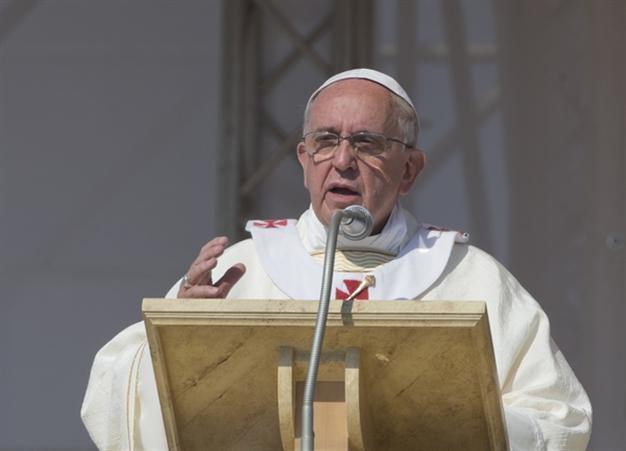Pope lambasts mobsters, says mafiosi "excommunicated"
Sibary, Italy - Reuters

Pope Francis celebrates a Mass in Sibari, southern Italy, Saturday, June 21, 2014. Pope Francis paid a one day visit to Castrovillari, Sibari, and Cassano allo Jonio, in the Calabria region of Italy. (AP Photo/Alessandra Tarantino)
Francis on June 21 issued the strongest attack on organised crime groups by a pontiff in two decades, accusing them of practicing the "the adoration of evil" and saying mafiosi are excommunicated.It was the first time a pope had used the word excommunication - a total cutoff from the Church - in direct reference to members of organised crime.
"Those who in their lives follow this path of evil, as mafiosi do, are not in communion with God. They are excommunicated," he said in impromptu comments at a Mass before hundreds of thousands of people in one of Italy's most crime-infested areas.
To sustained applause he told the crowd: "This evil must be fought against, it must be pushed aside. We must say no to it." He branded the local crime group, the 'Ndrangheta, as an example of the "adoration of evil and contempt of the common good" and said the Church would exert its full force in efforts to combat organised crime.
"Our children are asking for it, our young people are asking for it. They are in need of hope and faith can help respond to this need," he said.
Vatican spokesman Father Ciro Benedettini said the pope's stern words did not constitute a formal over-arching decree of canon (Church) law, regarding excommunication, which is a formal legal process.
Rather, he said it was more of a direct message to members of organised crime that they had effectively excommunicated themselves, reminding them that they could not participate in Church sacraments or other activities because they had distanced themselves from God through their criminal actions.
Still, the use of the highly charged word by a pope was significant because many members of organised crime in Italy see themselves as part of a religious, cult-like group, take part in sacraments, go to church and in some cases have also found complicity by some churchmen in the south.
The pope, Benedettini said, was trying to "isolate mafiosi within their own communities," sending a message that they should not in any way be looked up to as "men of honor."
Mafia bombs at Papal church
In 1993 Pope John Paul sternly warned members of Sicily's Mafia that they would "one day face the justice of God". The Mafia responded several months later with bomb attacks against several churches in Rome, including the Basilica of St. John's, which is a pope's church in his capacity of bishop of Rome.
Francis spoke in a homily at the end of day-long trip to the southern region of Calabria, home of the home of the mafia-style 'Ndrangheta which investigators say has spread around the world.
The 'Ndrangheta has been much harder for investigators to combat than the Sicilian Mafia because its structure is more lateral than hierarchical and its tightly-knit crime families are less flashy than the Sicilian mob and harder to penetrate.
A 2013 study by Demoskopia, an economic and social research institute, estimated the 'Ndrangheta's annual turnover at some 53 billion euros ($72 billion) in 30 countries, equivalent to about 3.5 percent of Italy's total official economic output.
Around half of its revenues came through drug trafficking, the study found.
Francis made the trip in part to pay tribute to Nicola "Coco" Campolongo, who was killed in the town along with his grandfather in an organised crime attack last January.
The charred body of the boy, who had been entrusted to his grandfather Giuseppe Iannicelli after his parents were jailed on drugs charges, was found along with those of Iannicelli and a Moroccan woman in a burnt-out car in the town.
Francis, who last January strongly denounced the murder and asked the killers to repent, comforted the boy's father and other relatives during a meeting a Vatican spokesman called highly emotional.
"Never again violence against children. May a child never again have to suffer like this. I pray for him continuously. Do not despair," the spokesman quoted the pope as saying.
The boy's parents and grandfather were part of a drugs trafficking clan of the 'Ndrangheta. Social workers have come under criticism for entrusting the boy to his maternal grandfather, a convicted drugs runner who was out on bail.
The bishop of the area the pope visited, Nunzio Galantino, is seen as one of the most progressive in Italy's poorer, underdeveloped south and has taken strong stands against organised crime.
But there have been instances of collusion of some priests in other areas of Calabria where the 'Ndrangheta is strongest, further south along the Italian peninsula near Reggio Calabria.
















